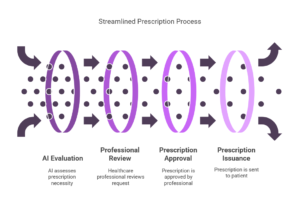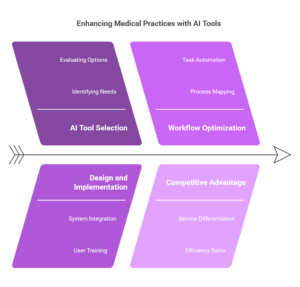Automation of medical processes – how can AI relieve the burden on doctors?

Automation of medical processes – how can AI relieve the burden on doctors?
The medical sector in Poland is evolving year by year. While there is still much to be done in public healthcare facilities, private clinics are significantly ahead in adopting modern solutions. One of the emerging standards is the use of AI in patient service, with voicebots playing a crucial role in automating medical processes, including issuing prescriptions. But how does this work? How is AI easing the daily workload of doctors?
AI is making bold strides in the polish healthcare sector
For several years, AI solutions have been increasingly utilized in the healthcare sector in Poland. This trend is confirmed by the report “Artificial Intelligence in Healthcare: Legal Security and Usage in Poland”, published in July 2024 by the SGH Think Tank. The report highlights the numerous benefits of harnessing AI’s potential, particularly in patient service, process automation, and simplifying procedures—including prescription issuance. Of course, these systems must comply with current legal regulations. In recent years, the Ministry of Health has been working on standardizing AI tools for use in medical facilities and private practices, ensuring they align with existing healthcare policies and professional standards.
Automating patient communication and appointment registration
The primary AI tool in medical facilities is an automated patient registration system. This specialized medical voicebot is designed to handle real-time conversations and schedule doctor appointments. The system is integrated with the specialists’ calendar, streamlining the process and reducing the workload for receptionists and nurses. All it requires is a predefined conversation script. This solution is successfully used by both private clinics and public healthcare centers (NFZ clinics). However, AI’s potential goes far beyond this. In the next section, we will explore how artificial intelligence can assist in issuing electronic prescriptions (e-prescriptions).
Automated prescription issuance system
A well-configured AI-powered bot can issue and send prescriptions to patients, significantly reducing the workload for doctors. This allows healthcare professionals to focus on patient care, which is their top priority. Automating this process saves valuable time—even if it enables a doctor to see just 1-2 more patients per day, it is a step in the right direction. Of course, these tools can only be used by authorized personnel, ensuring compliance with healthcare regulations.
The prescription ordering process is handled by a voicebot AI. The patient connects with the system and describes their needs. In real-time, the AI tool evaluates whether a prescription request is justified and prepares the necessary information for a receptionist or doctor. The healthcare professional reviews and approves the prescription, which is then sent to the patient. This efficient system enhances patient service, eliminating the need to wait on hold for hours or visit the clinic in person. It also saves time for doctors and medical staff, allowing them to focus on essential tasks.
In addition to voicebots, chatbots can also be used for this purpose. These AI-powered assistants communicate via text, making them ideal for patients who prefer written interaction or are unable to make phone calls. Prescription-ordering chatbots typically feature a user-friendly graphical interface that guides patients through the entire process. This convenient and secure solution further improves patient experience and streamlines medical services.

When is this type of automation beneficial?
This kind of automation is highly effective in various medical facilities, including those operated by the National Health Fund (NFZ). Every clinic is responsible for prescribing medications and issuing prescriptions, making automated prescription ordering a practical solution—especially for patients with chronic conditions who require long-term medication without frequent doctor intervention. For example, women continuing hormonal contraception can simply order a prescription via AI and wait for it to be sent. Typically, this is a quick and seamless process. Once received, the prescription can be presented at a pharmacy to purchase the necessary medications or obtain them for free if they are fully reimbursed under healthcare policies.
Well-implemented AI tools make doctors’ work easier
One thing is clear—properly selected, designed, and implemented AI tools bring significant benefits to medical facilities. They streamline daily tasks, enhance service quality, and improve patient care. This is particularly crucial for private medical practices, which must compete for patients and differentiate themselves through better service and efficiency. One major competitive advantage is an AI-powered automated prescription ordering system, which optimizes workflows and reduces administrative burdens on medical professionals.

Partner with experts
At EasyCall, we have been supporting the healthcare sector in its technological transformation for years. We provide high-quality AI tools tailored to the specific needs of each facility. Among our clients are Centrum Medyczne Gizińscy in Bydgoszcz and Omega Medical Clinics. You can join them too! Contact our expert, who will carefully analyze your needs and create a customized AI solution for your clinic. We always operate in full compliance with healthcare regulations, ensuring the safety of both your facility and patients. Get in touch today and let us help you successfully integrate AI into the medical sector!
